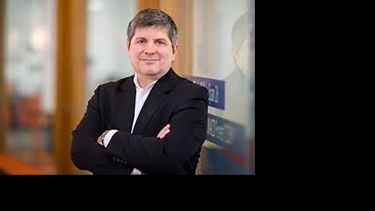A Visiting Professor in Sheffield's Department of Computer Science
As I am writing these lines from my home office, I am in the third and last year of a programme, the Royal Academy of Engineering Visiting Professorship scheme, RAEng VP. It is a wonderful programme that aims to bring industry experience into the classrooms of undergraduate engineers (and others).

As part of the scheme, I have been seconded from Thomson Reuters, later Refinitiv, in London, to teach and engage with students in Sheffield for two days per month.
These two days per month was a welcome enrichments, as I like interacting with students, and I know many researchers in Sheffield's excellent computer science and information science departments (as luck would have it, they are even in the same building).
So I started with a few guest appearances, teaching a bit of sentiment analysis here and a bit of information extraction case studies there. Serendipity struck, and from an informal chat in my office emerged a draft article on NLP ethics (still to be completed). Then I started teaching standalone project management, which in my view always a really good thing to know, regardless of whether you're going to be a system analyst or professional wedding planner. Software has its own perils of project management, and if you have not yet read the book Death March, then I advise you order it now.
The good thing about a visiting professor is they can experiment with teaching formats as well as content, and it took me a few months to figure out that is the way to go: the permanent staff of lecturers, readers and professors are bound to the curriculum and the structure of the various modules and degrees offered, which is only right as the department is well-organised, but also means they have less freedom to experiment with different content material or teaching formats; a lot has to be planned and get approval ahead of the semester. So I was lucky to be able to show up and improvise. A new format emerged as a result, and I called it the 'career clinic'. It's a 1:1 meeting where the student explains what part of computer science they are most passionate about, and I would ask what their plans are after their degree. The results ranged from a blank stare to utter panic, but either way a question about one's hobbies and sketching a couple of possible career trajectories, some hypothetical, others from people I know, led to a relief or even excitement. The future shouldn't be scary, it should excite you, if you have ideas, it has never been easier to transform your ideas into that magic spell called 'code' that makes your idea real, which opens myriads of opportunities.
A supplementary programme is not without its challenges. What should I offer? Will what I think is important resonate with the students? Is my material perhaps already covered by others? - These were my initial thoughts, but as it turns out it was more the practical matters that can be challenging: when is a good time to offer an extra lecture? Today's students are already quite burdened with dense curricula and time-tables, and they are very busy during term with exercises, essays, practicals, group projects. After term, students switch gears and go into exam preparation mode, which may also not be the best time. In the end, the pragmatic resolution was to just pick any nearby date, which sometimes worked well and on other occasions didn't. Students seemed to like best the parts of my lectures where I'd talk about actual industry projects and career advice.
This last year of the RAEng VP programme was hit by the Corona pandemic, which removed the two personal days in Sheffield and turned them into a virtual visit, which unfortunately takes aways the personal engagement as a motivating element for both sides, and replaces it with yet another tele-conference for your visiting professor, and yet another lecture to dial in from my little dorm room for the students. While the switch from in-person to remote study is not easy for students and staff alike, both have risen to the occasion and rapidly adjusted to the new CoViD-19 realities.
If anyone has questions e.g. about algorithms, or life as a scientist, industry careers, or the $100m question "What to do after I graduate?", feel free to drop me a note at leidner at ACM dot org. You can also follow me on Twitter (@jochenleidner).
I would like to thank Mark Stevenson for suggesting to me the possibility of applying for the Royal Academy of Engineering Visiting Professorship programme and Guy Brown for the friendly welcome in his department. Finally, thanks to the Royal Academy of Engineering for funding my trips to Sheffield.
